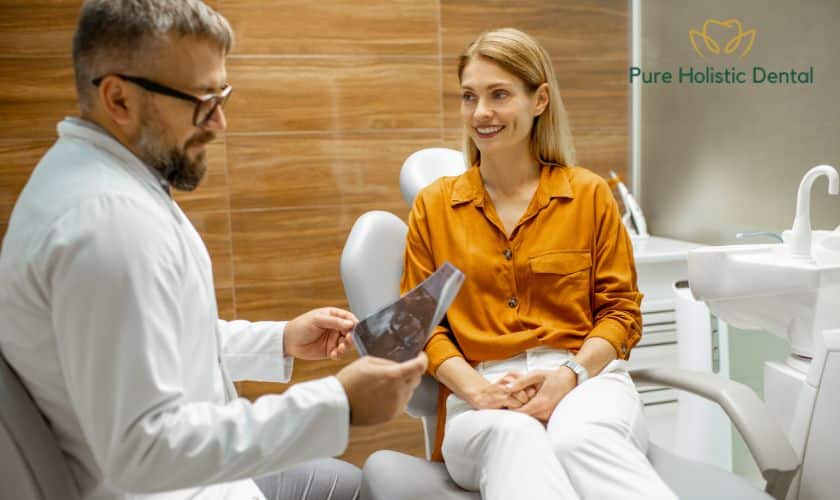Are your teeth just pearly whites to you, or are they the gatekeepers of your overall health and well-being? Well, this is where traditional and holistic dentistry comes into play. They might both care for your smile, but they have vastly different approaches and philosophies to dental health. Traditional dentistry is like a quick fix for your tooth troubles, while holistic dentistry is a holistic approach to your oral care and total health. Let’s dive into the world of teeth and explore the differences between these two dental approaches, shall we?
Traditional and holistic dentistry are two types of dental care that focus on different aspects of oral health. The goal of traditional dentistry is to prevent tooth decay and restore damaged teeth, while holistic dentists believe in treating the whole person as well as their teeth. Here’s how these two approaches differ:
Traditional Dentistry Focuses On The Prevention And Repair Of Oral Diseases
Traditional dentistry focuses on the prevention and repair of oral diseases. Dentists are trained to treat oral problems, such as cavities and gum disease, but their focus is not on preventing these conditions in the first place. Holistic dentists also perform crowns and fillings, but they also give more attention to providing preventative care by educating patients about their overall health and hygiene habits.
Holistic Dentistry Is A Universal Approach To Medicine
Holistic dentistry is an integrated approach to medicine that incorporates preventative medicine and wellness. It’s not just about treating teeth but the whole body–including your mind and emotions.
Holistic dentists treat the whole person instead of just one aspect of you (like your teeth). They pay attention to what causes pain or discomfort in the body, such as arthritis or neck pain. They address these issues while they assess whether there are any underlying health issues affecting your oral health. It may be beneficial for you to see a holistic dentist because their focus is on improving overall appearance rather than focusing specifically on one area.
Holistic Dentists View Oral Health As Part Of Total Health
It is the belief of holistic dentists that oral health is an integral part of a patient’s overall health and well-being. They believe the mouth is not just a collection of individual teeth and gums but a complex system connected to the rest of the body.
As such, they take a comprehensive approach to oral care, considering factors such as diet, lifestyle, and stress levels that may impact a patient’s oral health. By addressing oral health in the context of total health, holistic dentists aim to improve patients’ well-being and prevent systemic health problems that may arise from oral health issues.
This approach to dentistry is becoming increasingly popular as more people seek natural and less invasive treatments for their dental needs.
Why Is Holistic Dentistry Beneficial For Your Oral Health?
Holistic dentists are trained to look for signs of systemic disease. They are also trained to look for nutritional deficiencies, stress, and emotional health.
Holistic dentists use this holistic approach to provide you with the best dental care possible while maintaining your overall health.
Some benefits of holistic dentistry are:
-
Minimally Invasive Treatments
Holistic dentists prioritize using less-invasive and biocompatible treatments, reducing the risk of harm to the patient’s overall health.
-
Biocompatible Materials
Holistic dentists use materials that are safe for the body and do not release toxic substances, such as mercury-free fillings.
-
Consideration of Total Health
Holistic dentists take into account the impact of oral health on overall health and well-being, offering a more comprehensive approach to oral care.
-
Reduced Exposure to Radiation
Holistic dentists may use digital X-rays or alternatives such as thermal imaging or diagnostic laser technology, which emit less radiation than traditional X-rays.
-
Improved Overall Health
By addressing oral health in the context of total health, holistic dentistry can improve patients’ well-being and prevent systemic health problems.
-
Natural Approach to Oral Care
It offers a more natural approach to oral care, promoting health and wellness in a safe and biocompatible way.
-
Integration with Other Healthcare Providers
Holistic dentists often work closely with other healthcare providers, such as naturopathic doctors and acupuncturists, to offer a comprehensive approach to health and well-being.
The Bottom Line
The decision to pursue holistic dentistry is a personal one. You may be looking for a more natural approach to your dental care or have been unsatisfied with traditional dentistry and want to try something new. Whatever the reason, this article has given you some insight into why holistic dentistry is beneficial for your oral health.
FAQs
Q: What is the philosophy behind holistic dentistry?
A: Holistic dentistry is based on the belief that oral health is closely connected to overall health and that dental treatments should not harm the patient’s overall well-being.
Q: What are some of the common treatments offered by holistic dentists?
A: Holistic dentists may offer mercury-free fillings, biocompatible crowns and bridges, ozone therapy, and holistic orthodontics.
Q: How does holistic dentistry consider oral health’s impact on overall health?
A: Holistic dentists consider the systemic effects of oral health, such as the link between gum disease and systemic diseases like heart disease, diabetes, and stroke.
Q: Does holistic dentistry use X-rays?
A: Yes, holistic dentists will use X-Ray technology to help with diagnosis and treatment.
Holistic dentists may use digital X-rays, which emit less radiation than traditional X-rays, while others may use alternatives such as thermal imaging or diagnostic laser technology.



